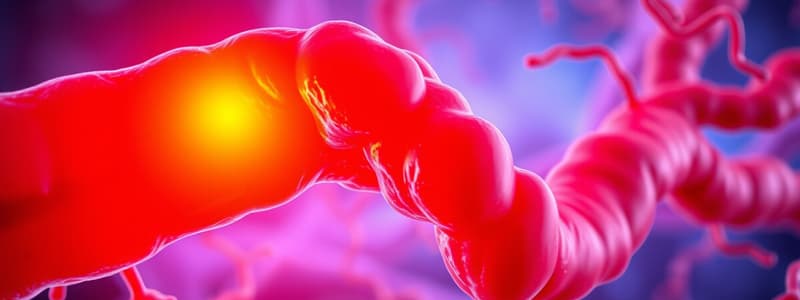Podcast
Questions and Answers
What is the primary function of gluconeogenesis?
What is the primary function of gluconeogenesis?
- Synthesis of carbohydrates from noncarbohydrate precursors (correct)
- Conversion of glucose into glycogen
- Utilization of glucose for energy in muscles
- The breakdown of carbohydrates into glucose
Under normal conditions, which organ is primarily responsible for gluconeogenesis?
Under normal conditions, which organ is primarily responsible for gluconeogenesis?
- Pancreas
- Liver (correct)
- Heart
- Skeletal Muscle
Which of the following compounds does NOT serve as a gluconeogenic precursor?
Which of the following compounds does NOT serve as a gluconeogenic precursor?
- Acetoacetate (correct)
- Glycerol
- Alanine
- Lactate
In which state might the kidneys contribute significantly to gluconeogenesis, potentially up to 50%?
In which state might the kidneys contribute significantly to gluconeogenesis, potentially up to 50%?
Which step in the gluconeogenic pathway involves the conversion of oxaloacetate (OAA) to phosphoenolpyruvate (PEP)?
Which step in the gluconeogenic pathway involves the conversion of oxaloacetate (OAA) to phosphoenolpyruvate (PEP)?
What is the major hormonal regulator of gluconeogenesis?
What is the major hormonal regulator of gluconeogenesis?
Which of the following processes is essential for maintaining glucose levels in the postprandial state?
Which of the following processes is essential for maintaining glucose levels in the postprandial state?
Which of the following is a necessary step in the gluconeogenic pathway following the conversion of F1,6-BP?
Which of the following is a necessary step in the gluconeogenic pathway following the conversion of F1,6-BP?
What is the role of glycerol in gluconeogenesis?
What is the role of glycerol in gluconeogenesis?
What is the primary function of alanine in anaerobic metabolism during the Cori cycle?
What is the primary function of alanine in anaerobic metabolism during the Cori cycle?
Which of the following factors does NOT influence the direction of the lactate to pyruvate conversion?
Which of the following factors does NOT influence the direction of the lactate to pyruvate conversion?
Which of the following statements is true regarding the pyruvate dehydrogenase reaction?
Which of the following statements is true regarding the pyruvate dehydrogenase reaction?
What is the net ATP yield from one glucose molecule during anaerobic metabolism in muscles?
What is the net ATP yield from one glucose molecule during anaerobic metabolism in muscles?
Where does the conversion of lactate into pyruvate primarily occur?
Where does the conversion of lactate into pyruvate primarily occur?
Which metabolic pathway does pyruvate enter after its conversion into acetyl CoA?
Which metabolic pathway does pyruvate enter after its conversion into acetyl CoA?
What type of tissue is primarily responsible for gluconeogenesis from lactate?
What type of tissue is primarily responsible for gluconeogenesis from lactate?
What condition favors the conversion of lactate to pyruvate in gluconeogenesis?
What condition favors the conversion of lactate to pyruvate in gluconeogenesis?
Which of the following correctly describes the relationship between lactate and pyruvate in the context of anaerobic metabolism?
Which of the following correctly describes the relationship between lactate and pyruvate in the context of anaerobic metabolism?
What is the primary driver of cytosolic OAA decarboxylation?
What is the primary driver of cytosolic OAA decarboxylation?
Which enzyme catalyzes the decarboxylation and phosphorylation of OAA in the cytosol?
Which enzyme catalyzes the decarboxylation and phosphorylation of OAA in the cytosol?
What is required for the activation of PEP carboxykinase?
What is required for the activation of PEP carboxykinase?
What is the significance of fructose 1,6-biphosphatase in gluconeogenesis?
What is the significance of fructose 1,6-biphosphatase in gluconeogenesis?
Which of the following signals an energy-poor state and inhibits fructose 1,6-biphosphatase?
Which of the following signals an energy-poor state and inhibits fructose 1,6-biphosphatase?
How does citrate affect gluconeogenesis?
How does citrate affect gluconeogenesis?
What is the conversion from PEP to F1,6BP in gluconeogenesis analogous to?
What is the conversion from PEP to F1,6BP in gluconeogenesis analogous to?
What role does fructose 2,6-bisphosphate have in gluconeogenesis?
What role does fructose 2,6-bisphosphate have in gluconeogenesis?
What is the role of pyruvate carboxylase in gluconeogenesis?
What is the role of pyruvate carboxylase in gluconeogenesis?
What enzyme catalyzes the conversion of fructose 6-phosphate to glucose 6-phosphate?
What enzyme catalyzes the conversion of fructose 6-phosphate to glucose 6-phosphate?
Which of the following statements about glucose 6-phosphatase is true?
Which of the following statements about glucose 6-phosphatase is true?
What is the primary role of glucose 6-phosphate translocase?
What is the primary role of glucose 6-phosphate translocase?
Why can muscle cells not provide blood glucose through gluconeogenesis?
Why can muscle cells not provide blood glucose through gluconeogenesis?
Which symptom is NOT typically associated with the condition outlined in the case presentation?
Which symptom is NOT typically associated with the condition outlined in the case presentation?
In the context of glycogen storage diseases, what does Type Ia refer to?
In the context of glycogen storage diseases, what does Type Ia refer to?
What is a key treatment mentioned for the condition described?
What is a key treatment mentioned for the condition described?
In the context of the case, which of the following conditions is most likely to worsen without treatment?
In the context of the case, which of the following conditions is most likely to worsen without treatment?
How does the reverse of the glycolytic pathway differ from gluconeogenesis?
How does the reverse of the glycolytic pathway differ from gluconeogenesis?
Which clinical sign correlates with developmental issues and seizures in the provided case?
Which clinical sign correlates with developmental issues and seizures in the provided case?
What distinguishes gluconeogenesis from glycolysis at the enzymatic level?
What distinguishes gluconeogenesis from glycolysis at the enzymatic level?
Which metabolic process cannot yield glucose from muscle glycogen due to the absence of glucose 6-phosphatase?
Which metabolic process cannot yield glucose from muscle glycogen due to the absence of glucose 6-phosphatase?
The 2 year old male’s poor growth and repeated seizures are likely manifestations of which condition?
The 2 year old male’s poor growth and repeated seizures are likely manifestations of which condition?
What could potentially be an early sign of the condition in the case of the young male patient?
What could potentially be an early sign of the condition in the case of the young male patient?
What is the primary effect of the lack of glucose 6-phosphatase in patients with Type Ia glycogen storage disease?
What is the primary effect of the lack of glucose 6-phosphatase in patients with Type Ia glycogen storage disease?
In what manner does the energy requirement for gluconeogenesis compare to glycolysis?
In what manner does the energy requirement for gluconeogenesis compare to glycolysis?
Flashcards are hidden until you start studying
Study Notes
Overview of Gluconeogenesis
- Gluconeogenesis synthesizes carbohydrates from noncarbohydrate precursors.
- Primarily occurs in the liver (85-95% of glucose production) and kidneys (10% during normal conditions), with potential kidney contribution of up to 50% during starvation.
- Small intestinal epithelial cells contribute about 5% in some scenarios.
Substrates
- Key gluconeogenic precursors include:
- Lactate
- Pyruvate
- Alanine
- Glycerol (from triglycerides)
Gluconeogenic Pathway
- Involves several key steps:
- Pyruvate Carboxylation: Converts pyruvate to oxaloacetate (OAA).
- OAA Transport to Cytosol: OAA transported to cytosol for further processing.
- Cytosolic OAA Decarboxylation: Converts OAA to phosphoenolpyruvate (PEP) catalyzed by PEP carboxykinase (PEPCK).
- Conversion of PEP to Fructose 1,6-Bisphosphate (F1,6-BP): Reversal of glycolysis, employing the same enzymes.
- Fructose 1,6-Bisphosphate Dephosphorylation: Catalyzed by fructose 1,6-bisphosphatase, bypassing the irreversible phosphofructokinase-1 (PFK-1) reaction.
- Conversion of Fructose 6-Phosphate (F6P) to Glucose 6-Phosphate (G6P): Reverse of glycolytic process.
- Glucose 6-Phosphate Dephosphorylation: Enzymes involved include glucose 6-phosphate translocase and glucose 6-phosphatase.
Regulation of Gluconeogenesis
- Hormonal Regulation:
- Elevated AMP levels inhibit fructose 1,6-bisphosphatase, signaling low energy states.
- Citrate stimulates gluconeogenesis.
- Fructose 2,6-Bisphosphate: Plays a regulatory role by controlling enzymatic activities within the pathway.
Alanine and the Cori Cycle
- In the Cori cycle, lactate is shuttled from exercising muscles to the liver to aid anaerobic metabolism.
- Muscle anaerobic metabolism yields 2 net ATP and 2 pyruvate per glucose molecule.
- Lactate is converted back to pyruvate in the liver through lactate dehydrogenase (LDH), which depends on NAD/NADH and lactate/pyruvate ratios.
Ketogenic Compounds
- Pyruvate is irreversibly converted to acetyl CoA, which cannot be used for gluconeogenesis, leading to the formation of compounds like acetoacetate.
- Four alternate reactions favor glucose synthesis circumventing the pyruvate dehydrogenase irreversible step.
Enzymatic Roles and Disorders
- Glucose 6-phosphatase deficiency causes Type Ia glycogen storage disease, preventing muscle cells from converting glycogen to blood glucose.
- Regulatory enzymes in gluconeogenesis are crucial for maintaining glucose homeostasis, with deficiency impacts evident in metabolic disorders.
Clinical Presentation
- A case of severe lactic acidosis in a 2-year-old highlights potential developmental issues and metabolic disturbances associated with gluconeogenesis regulation.
Summary
- Gluconeogenesis shares common reactions with glycolysis but is regulated differently.
- Key enzymes distinguish pathways, impacting energy levels, substrate availability, and hormonal influence.
Studying That Suits You
Use AI to generate personalized quizzes and flashcards to suit your learning preferences.



